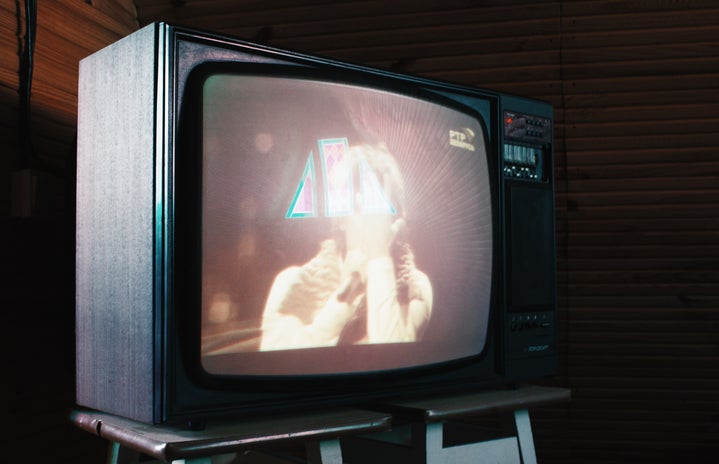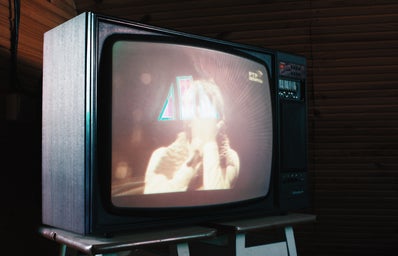Edited by: Kaavya Azad
“She’s still outside. She’s the bahu of the house, damn it! It’s 10 pm; what is she still doing outside? Have you no control over your own wife? Shameful, I’m ashamed to have to call you my son!”
The elderly lady on the TV, draped up in an exquisite saree and bejewelled from top to toe in shiny ornaments, huffs dramatically and proceeds to walk out of the room after chewing out her son. With a contorted face, he goes on to have an internal monologue, agreeing with his mummy and calling himself an idiot for trusting his wife.
Sitting next to me, my elderly female relative chortles and says, barely under her breath, stupid boy, her eyes gleaming at the television screen. She turns to me, awaiting my approval, only to see my eyes wide in disbelief and mildly horrified expression.
This anecdote more or less encapsulates the feelings I have every time I decide I have nothing better to do than join the women in my relatives’ house for their soirée in front of the television. Bengali soaps start at 6 pm and go on till 10 pm, and the contents usually get more scandalous as the shows progress into one after the other. The viewership of these Bengali serials, interestingly, is not limited to any specific strata of society, but instead, pertains mainly to women viewers from all socio-economic backgrounds in Bengali society; anyone with a TV set, a cable connection and time to spare, at home.
The craze surrounding OTT platforms has not yet reached the older generations of middle-class Bengali households, who still resort to the good old television set every evening as their main source of entertainment. This has only increased with the advent of the COVID-19 pandemic; in fact, Tollywood serials were fully being filmed and shot even during the lockdown to make sure people quarantining at home would not be without a source of entertainment. And for what it is worth, watching the characters on the shows go about their ways in the usual dramatic flair but with masks on, for the sake of continuing storylines, which cannot entertain a pandemic, was undeniably entertaining quite a few times.
Misogyny on television isn’t new to me. It honestly doesn’t come across as too much of a surprise that Asian dramas at large still uphold the patriarchy in numerous ways. As an ardent consumer of K-dramas and C-dramas (and the occasional Thai dramas) myself, the misogyny that shows itself through the narratives of toxic and aggressive male leads and romanticisation of abuse, makes for a whole other conversation for a different day.
Bengali Serials and Tropes in Domesticity
Closer home for me, though, Bengali soap operas, which pick up on several elements started by the Ekta Kapoor brand of serials, seem to reflect a very discernible facet of Bengali domesticity while essentially recycling the same tired old tropes. Women characters — often paraded as the heights of progressive liberalism — are written in those same storylines of the inter-generational dramas in joint families at the end of the day.
Through these storylines, TV soap culture constructs its own idea of femininity through its matrix of the ‘good woman/bad woman’ dichotomy; the ‘ideal’ woman in relation to whether or not she is the obedient, subservient ‘Lakshmi’ of the house versus the ambitious, outspoken ‘Alakshmi’ who is demonised and vilified, all in the context of vicious circles of middle-class morality and glorious dysfunction.
Through its 6-10 schedule catering largely to a female, homemaker audience, these serials and soap operas, more often than not, reference widely prevalent goddess tropes (as seen in the Lakshmi/Alakshmi ideal). This is often used in the hyper-feminine/feminist energy in popular Bengali culture, while the Westernised/glamorised and assertive vamp character is cultivated as the hyper-modern anti-heroine. The serials also help reinforce a specific point explained by Jashodhara Bagchi in her work: ‘Representing Nationalism: Ideology of Motherhood in Colonial Bengal.’ The glorification of motherhood in colonial Bengal through nationalist, ideological imagery is reinforced by Bengali TV soap culture to this day, wherein these tropes and storylines domesticate the mother goddess. By placing femininity on a pedestal, these shoes often work in denial of actual on-ground realities of the conditions of women.
An Invisible Modernity: From Goddesses to the Guise of ‘Girl Power’
Other than mobile phones and laptops, very few signs of modernity are seen in these serials. That is not very surprising considering how these shows at large— no matter how ‘progressive” they are— always mandatorily hold on to tradition. In my opinion, it’s a kind of forceful imposition that can often manifest in harmful ways in the sense that they reinforce casteist, classist, and largely misogynistic stereotypes and tropes.
Any attempts of assuming modernity can be seen in the efforts of writing ‘girl power’ narratives. I will give the soaps this; some genuinely impactful shows have indeed managed to start conversations, despite them pertaining mainly to upper-caste households. There are narratives of women who do not fit into the traditional standards of beauty and attractiveness finding love and happiness (Radha). Some narratives challenge conventional family roles and structures (Andarmahal). Old spinster aunts are allowed to dream of romance in Bengali serials (Kusumdola). Somewhere in the plots’ tortuous progress, the Radhas, Imans and Meghlas show they have agency.
Internalisation and Depth of the ‘Progressiveness’
This ‘progressiveness,’ however, is skin-deep, limited to the premise. For example, Phirki, in Zee Bangla’s namesake serial, is a younger protagonist on screen. Phirki is the foster daughter of a trans person, Lokkhi. Phirki studies to be a lawyer but is caught as a daughter-in-law in a political family. Even though Phirki raises pertinent points questioning societal dogma and inherent sexism, she still performs femininity vis-à-vis her romantic relationship; it’s akin to code-switching between the so-called ‘feminist’ and ‘feminine.’ Since much of television is visual in meaning and messaging, Phirki’s transformation from wearing wash-and-wear saris with a simple handbag and wristwatch to brocade weaves and heavy gold necklaces tell much. On the other hand, Alia, the ‘vamp,’ flaunts her curled, bronzed locks, gowns and luxury handbags, an image contrasting directly with the one portrayed by Phirki herself.
The most disheartening facet of the show lies in the gifted actor, Arja Banerjee, an upper-caste, cisgender woman playing Lokkhi, a trans woman. Instead, an artist from the transgender community could have significantly raised the bar of an already skewered representational ratio.
Somewhere deep inside, the attempt and want to raise a mirror to the inequities of society is evident; the plight of women in a man’s world. But so many of these shows simultaneously spare us any self-introspection because the bad guys are so nasty that we can all feel smugly superior. When the family patriarch in Andarmahal tells his daughter-in-law’s mother, “You have brought her back already! You couldn’t afford to feed her for a few more days?”, we can rest happy that our family would never be so crass, as put by Sandip Roy in The Hindu.
It is insidiously clever, portraying sexism we all enable, yet always letting us off the hook. By showing the ‘bad guys’ in the serials as absolutely obnoxious and intolerable and the ‘normal’ characters as quite vicious under normal circumstances, these serials essentially bring down the standards of morality and social responsibility.
Once we get past the dramatic flair and the incomprehensible storylines, we’re left with misogyny, classism, casteism, and even the occasional queerphobia that we are capable of — and quite possibly partake in — in our everyday lives as well. After all, unlearning our problematic, toxic biases can be a lifelong process, and despite our best efforts, we can still unknowingly end up being complicit.
The internalisation comes into the question when we consider how widely popular these TV soaps are and how consistently they are watched by people, specifically women, every day. Any form of media that is not consumed critically ends up being propaganda. An example of this would be the discourse surrounding the popular Hindi show 4 More Shots Please!, wherein, under the guise of girl power, the show upholds a very distinct upper-caste and upper-class veil. While the show has indeed been lauded for its so-called ‘progressiveness’, it is the nuances we must consider when we engage critically; coming to the realization that despite attempts and good-intentioned portrayals, the message can always get delivered incorrectly.However, for the most part, for those from the older generations, including our older female relatives and grandmothers, who are getting increasingly housebound, there is, unfortunately, little else to do. However, in our limited capacities, we can start conversations in our own homes where we try to counter the internalisation of these harmful tropes by our family members and strengthen the larger narrative and fight against internalised misogyny. Maybe, sit with our grandmothers and mothers and aunts, and every time we see one of these tropes, have these tough conversations that may be difficult at first but will be completely worth it. Question it. Challenge it. After all, like charity, shouldn’t unlearning begin at home as well?


